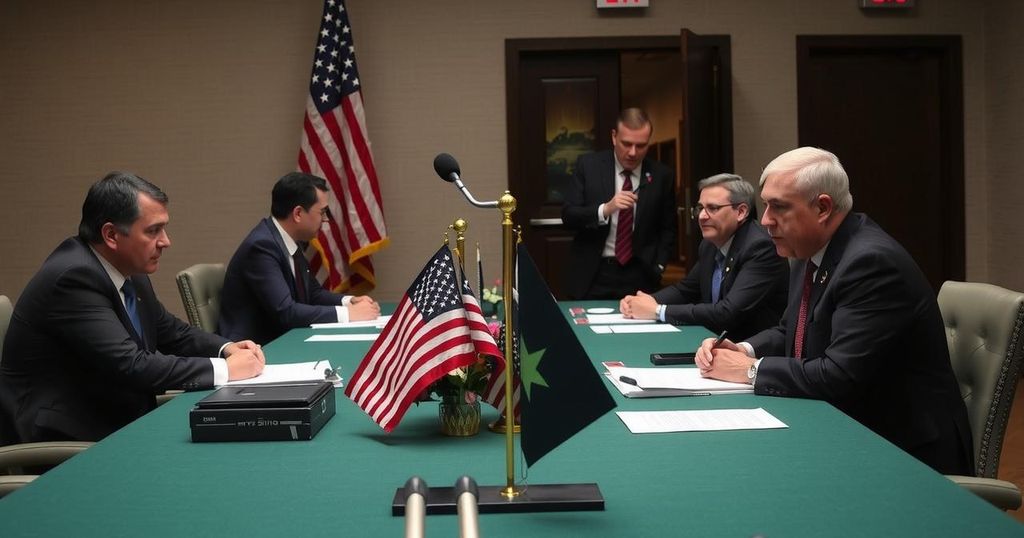Global news
AMERICA, AQABA, ASIA, ASSAD, AUSTIN TICE, BASHA, BASHAR AL - ASSAD, BLINKEN, CNN, CNN POLITICS, CONFLICT, EUROPE/ASIA, HAYAT TAHRIR AL - SHAM, HTS, HUMANITARIAN CRISIS, IRAQ, JORDAN, NORTH AMERICA, PHILIPPINES, SYRIA, SYRIAN CIVIL WAR, TERRORISM, TURKEY, UNITED STATES, US, WAR CRIMES
Jamal Walker
0 Comments
US Confirms Direct Contact with Syrian Rebel Group Amid Regional Turmoil
Secretary of State Antony Blinken confirmed that the United States has directly communicated with the Syrian rebel group Hayat Tahrir al-Sham, amid the collapse of President Assad’s regime. This revelation emphasizes US efforts to mobilize international support for establishing a new governance framework in Syria that respects human rights and combats terrorism, while addressing concerns about the resurgence of ISIS. Blinken’s discussions with regional partners reflect an intricate balancing act as the US navigates complex dynamics in the region.
In a significant development concerning foreign relations in the Middle East, Secretary of State Antony Blinken confirmed that the United States has engaged in direct communication with Hayat Tahrir al-Sham (HTS), a rebel group that currently exercises control over parts of Syria. This revelation marks the first public acknowledgment of such contact, which has arisen amidst the turbulent backdrop following the destabilization of President Bashar al-Assad’s regime.
During a press briefing in Aqaba, Jordan, Blinken stated, “Yes, we’ve been in contact with HTS and the other parties,” yet refrained from detailing the specifics regarding the nature or level of the interactions. He emphasized the necessity of prioritizing the safe return of American journalist Austin Tice, who has been detained in Syria for over a decade, indicating renewed US efforts following the regime’s collapse.
The United States has articulated its expectations for a new Syrian governance structure, stressing the need for safeguarding Syrian citizen rights, preventing the territory from being used for terrorism, ensuring the provision of humanitarian assistance, and securing chemical weapon stockpiles for destruction. These principles were collectively affirmed in a recent joint statement from the US and international allies during an urgent ministerial meeting.
Moreover, Blinken’s diplomatic engagements in Jordan, Turkey, and Iraq aimed to establish a consensus regarding these principles, underscoring the stakes involved in supporting the Syrian populace in this transitional phase. He remarked on the broader implications of Syrian dynamics, which could have a far-reaching impact beyond its borders, including issues related to terrorism and mass displacement.
The ongoing conflict in northern Syria has posed additional complications, particularly as US-backed Syrian Democratic Forces (SDF) confront Turkish-backed factions, temporarily halting actions against ISIS. As current hostilities present a risk of ISIS regaining strength, Blinken reiterated the importance of the SDF’s role moving forward, advocating for actions that would focus on combating the remnants of ISIS amid this critical juncture.
In discussions with Turkish officials, Blinken cautioned against any maneuvers that may inadvertently undermine SDF operations and increase ISIS’s resurgence. Furthermore, during his time in Iraq, he urged Prime Minister Mohammed Shia al-Sudani to suppress Iranian-backed militias, highlighting the potential threats posed to US interests and personnel from these armed groups.
The Israeli government’s military operations in Syria have also surfaced as a contentious topic in US-Arab relations. While many Arab nations have condemned Israel’s actions as illegal seizures of territory, Blinken noted that the US is facilitating dialogue with Israeli officials, seeking stability and preventing military resources from falling into extremist hands.
Looking forward, Blinken conveyed cautious optimism but acknowledged the complexities involved in the region’s evolving landscape. He articulated that the current moment necessitates careful navigation to ensure concerted efforts among various factions can lead to a semblance of stabilization in Syria, advocating for continued international cooperation and vigilance against potential threats.
The recent confirmation of US engagement with Hayat Tahrir al-Sham, a group designated as a terrorist organization, arises from the shifting political landscape in Syria following the apparent weakening of Assad’s government. The upheaval has compelled the US to reassess its diplomatic strategies in dealing with various factions within the country as efforts to secure stability and humanitarian needs evolve. These developments take place within a broader context of combating terrorism and preventing the resurgence of extremist factions like ISIS, necessitating a coordinated international response. In this environment, Secretary Blinken’s dialogues with regional partners underscore the urgency of establishing a framework for a new government that promotes peace and stability, amidst challenges posed by both internal and external entities seeking to exploit the transitional period.
The confirmation of direct US communication with Hayat Tahrir al-Sham represents a pivotal moment in American foreign policy towards Syria, reflecting the complexities of engaging with designated terrorist groups amid shifting allegiances. Secretary Blinken’s efforts to articulate a unified stance for a prospective Syrian government demonstrate a commitment to safeguarding human rights and preventing terrorism. While challenges remain, particularly concerning the re-emergence of ISIS and regional tensions involving Turkish and Iranian influences, the current diplomatic initiatives highlight a strategic approach to fostering stability in a volatile region.
Original Source: www.cnn.com




Post Comment